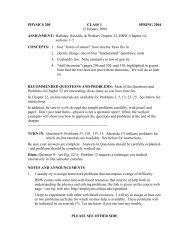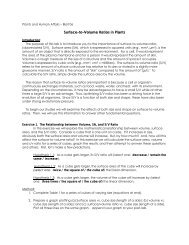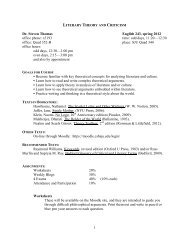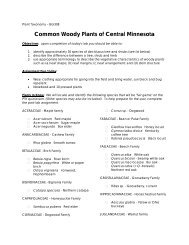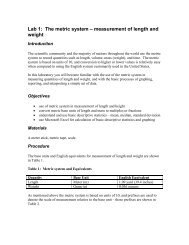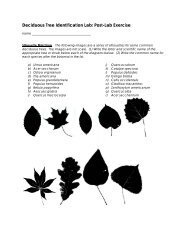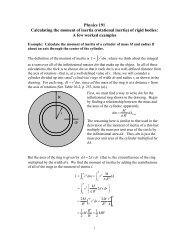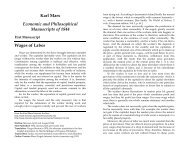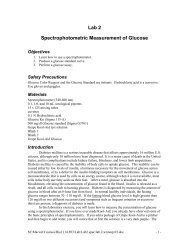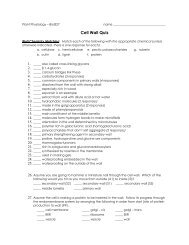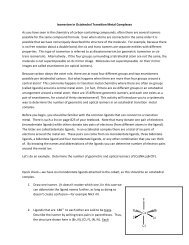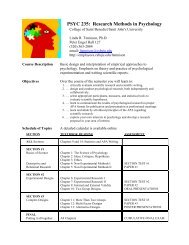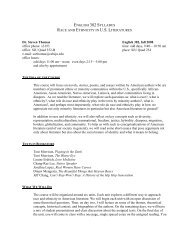CULTURAL AND EVOLUTIONARY COMPONENTSOF MARITAL SATISFACTIONA Multidimensional Assessment <strong>of</strong> Measurement InvarianceTODD LUCASWayne State UniversityMICHELE R. PARKHILLUniversity <strong>of</strong> WashingtonCRAIG A. WENDORFUniversity <strong>of</strong> Wisconsin–Stevens PointE. OLCAY I ⋅ MAMOĞLUMiddle East Technical University, Ankara, TurkeyCAROL C. WEISFELDUniversity <strong>of</strong> Detroit MercyGLENN E. WEISFELDWayne State UniversityJILIANG SHENBeijing Normal UniversityCouples assess their satisfaction with one another according to numerous culturally determined criteria.However, evolutionary perspectives on marriage emphasize that husbands and wives are also concerned withtheir adaptive fitness, and this suggests that some aspects <strong>of</strong> marital satisfaction may be cross-culturally homogenous.We examined whether marital satisfaction reflects both ‘culturally unique’ and ‘adaptively universal’ concerns<strong>of</strong> husbands and wives. Approximately 2000 couples from Britain, Turkey, China and the United Statescompleted a multidimensional measure <strong>of</strong> marital satisfaction that we assessed for measurement invariance.Measures <strong>of</strong> romantic love and spousal support functioned similarly for couples within all four cultures, indicatingthe possibility <strong>of</strong> a ubiquitous pair-bonding component <strong>of</strong> marital satisfaction. However, invariant measurementstructure was less robust across these samples, suggesting a culturally derived component <strong>of</strong> maritalsatisfaction. In general, results suggest that invariance analyses may be used to elucidate cultural and evolutionaryperspectives on marriage.Keywords:marriage; marital satisfactionl; invariance; love; Turkey; China; United Kingdom; United StatesInterpersonal relationships are heavily guided by norms, customs, and expectations thatare derived from culture (for reviews, see Berscheid, 1995; Fiske, Kitayama, Markus, &Nisbett, 1998). In particular, satisfaction with one’s spouse may largely depend on thedegree to which a marriage fulfills culturally determined expectations and obligations. OnAUTHORS’ NOTE: Portions <strong>of</strong> this article were prepared while the first author was a postdoctoral researcher at the Center forBehavioral and Decision Sciences in Medicine (Ann Arbor Veterans Affairs Hospital and University <strong>of</strong> Michigan). Portions <strong>of</strong>this research were presented at the 2003 annual meeting <strong>of</strong> the Human Behavior and Evolution Society, in Lincoln, Nebraska.We are grateful to Robin J. H. Russell and Pamela A. Wells for their contributions to this research. In addition, we acknowledgethe helpful comments <strong>of</strong> Cindy Gallois and two anonymous reviewers on prior versions <strong>of</strong> this article. Correspondence concerningthis article may be addressed to Todd Lucas, Division <strong>of</strong> Occupational and Environmental Health, Department <strong>of</strong> FamilyMedicine and Public Health Sciences, Wayne State University, 3800 Woodward Avenue, Suite 808; Detroit, MI 48201. E-mail:tlucas@med.wayne.edu.JOURNAL OF CROSS-CULTURAL PSYCHOLOGY, Vol. 39 No. 1, January 2008 109-123DOI: 10.1177/0022022107311969© 2008 Sage Publications109Downloaded from http://jcc.sagepub.com at College <strong>of</strong> St. Benedict/St. John's University on April 10, 2008© 2008 SAGE Publications. All rights reserved. Not for commercial use or unauthorized distribution.
110 JOURNAL OF CROSS-CULTURAL PSYCHOLOGYthe other hand, evolutionary research and theory has emphasized that besides satisfyingculture-specific functions, marriage must also enhance the basic adaptive objectives <strong>of</strong>both husbands and wives. Specifically, marriage should facilitate not only procreation butalso appropriate caregiving behaviors for <strong>of</strong>fspring, and marital satisfaction may be importantto the extent that it enables this.The juxtaposition <strong>of</strong> cultural and evolutionary perspectives poses an interesting question formarital satisfaction research—namely, in what ways can satisfying marriages be both culturallyunique and universally adaptive? In the present study, we examined the measurement invariance<strong>of</strong> two indices <strong>of</strong> marital satisfaction (romantic love and communication/support) in couplesfrom the United States, Britain, Turkey, and China. To the extent that evolutionary andcultural perspectives respectively emphasize some alternative themes <strong>of</strong> marriage, our purposewas to determine whether two specific criteria that couples might use to define a satisfying marriageshould be considered inherently universal or culturally unique.MARITAL SATISFACTION AND CULTUREMarriages are generally more successful when spouses establish a sense <strong>of</strong> satisfaction withone another. However, researchers tend to diverge in their view <strong>of</strong> how satisfaction with one’sspouse is attained. Some <strong>of</strong> the most important and interesting distinctions are posited by culturaland evolutionary perspectives on marriage. From a cultural vantage point, marital satisfactionmay be enhanced to the extent that a marriage fulfills culturally determined expectationsand obligations <strong>of</strong> husbands and wives. In particular, the criteria for a satisfying marriage maybe highly varied and may depend on a unique set <strong>of</strong> culturally enforced norms, values, andobligations. For example, a traditional Chinese marriage may be satisfying to the extent that itfulfills familial duties that include the production <strong>of</strong> a male heir for the continuance <strong>of</strong> a familyline, the acquisition <strong>of</strong> a daughter-in-law who will provide support for the husband’s parents,and the begetting <strong>of</strong> sons who will provide for the security <strong>of</strong> the couple in their old age (Wang,1994). In addition, traditional Chinese marriages <strong>of</strong>ten represent the formation <strong>of</strong> an alliance <strong>of</strong>two extended families, whose interests supplant those <strong>of</strong> the to-be-married couple (Dion &Dion, 1993). On the other hand, Western cultures generally view marriage as serving fewerinstrumental and more personal functions and are thus thought to be satisfying to the extent thatthey fulfill happiness or hedonistic goals <strong>of</strong> husbands and wives (e.g., Lalonde, Hynie, Pannu,& Tatla, 2004). In addition, although social obligations are a defining feature <strong>of</strong> marriage inmany Eastern cultures, such influences may be viewed as obstacles to personal happiness inWestern cultures (Fiske et al., 1998).WITHIN-CULTURE HETEROGENEITY AND MARITAL SATISFACTION<strong>Cross</strong>-national differences are one defining feature <strong>of</strong> the cultural perspective. However, anequally important facet concerns the influence <strong>of</strong> economic and sociopolitical contexts withina culture (e.g., Zavalloni, 1975). In China, for example, the New Marriage Law <strong>of</strong> 1950 formallyabolished the traditional arranged marriage system and put in its place a system <strong>of</strong> freechoice and equal rights for both husbands and wives. China has also been informally influencedby Western thought that has further altered attitudes about marriage (Higgins, Zheng,Liu, & Hui Sun, 2002). However, a majority <strong>of</strong> the Chinese population live in rural areas,where formal and informal influences are not as powerful. Accordingly, covertly evolvedforms <strong>of</strong> traditional marriages can still occur in China (Wang, 1994). Thus, there is alsoDownloaded from http://jcc.sagepub.com at College <strong>of</strong> St. Benedict/St. John's University on April 10, 2008© 2008 SAGE Publications. All rights reserved. Not for commercial use or unauthorized distribution.



